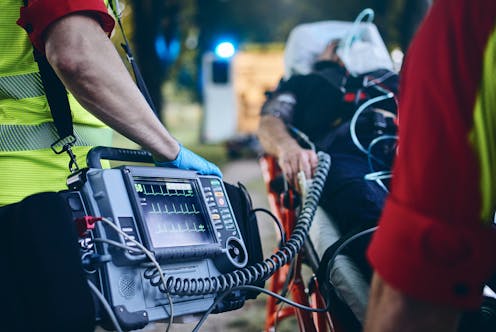Source: The Conversation (Au and NZ) – By Clare Arnott, Co-Director of Global Chronic and Complex Diseases, George Institute for Global Health
A concerning report recently published in Nature Medicine suggests even a mild case of COVID can increase the long-term risks of serious cardiovascular diseases such as stroke, heart attack and heart failure. The study highlights our limited understanding of the full consequences of COVID infection and the long-term impact of the COVID pandemic.
Australia has now reported more than 10 million cases of acute COVID infection and more than 14,000 deaths, with at least 600 million more people infected worldwide.
The immediate effects of COVID infection on the heart have been well documented, with myocarditis (inflammation of the heart muscle) an infrequent but potentially lethal complication. But myocarditis only occurs in about 40 people per million infected.
The big concern raised by this fresh study is that medium- to long-term harms on the body’s blood vessel network (the vascular system) may be much more common than that. And it could drive a new pandemic of cardiovascular disease over the coming years.
Read more:
Imagining COVID is ‘like the flu’ is cutting thousands of lives short. It’s time to wake up
What they found
The study, led by researchers at Washington University, showed a heightened risk of future cardiovascular events among people who have recovered from COVID.
The authors analysed the health records of around 150,000 US veterans, who are often studied because they are a well-documented group within a discrete health-care system. They compared the rates of cardiovascular disease in veterans who’d experienced a COVID infection against uninfected control groups that included some 10 million people.
Between 30 days and a year after recovery from COVID, survivors were 52% more likely to have a stroke, 63% more likely to have a heart attack, and 72% more likely to develop heart failure. This means that over one year, for every 1,000 people who had COVID, there would be five extra strokes, three extra heart attacks and 12 extra cases of heart failure. There was also evidence of an increased risk of serious blood clots on the lungs.
While these numbers might sound small to some, when scaled to 600 million COVID infections worldwide, the implications are enormous.
One particularly concerning finding was that while those with more severe acute COVID infections had the highest risk of a cardiovascular events over the following year, even those with a mild infection were at increased risk. And that risk was not restricted to those who’d had heart health problems before – it could affect anyone.
Necessary cautions
The study was large and had many strengths. But the findings must be reviewed with a degree of caution. It was an observational study (in which researchers draw inferences from what they see in a population, rather than control variables for an experimental study). So, we can’t be certain the increased risk of heart disease or stroke was definitely caused by the COVID infection. The people infected with COVID were not identical to the people who were uninfected.
That said, the researchers made statistical adjustments and could not identify another explanation for the large increases in risks seen.
It is also likely some people with asymptomatic COVID infection were accidentally included in the control groups. However, the effect of this would have been to underestimate the risks of COVID infection on cardiovascular risk.
And of course, US veterans are a very particular set of individuals (mostly older, male and white). Even if the effects of COVID on cardiovascular risk are real for them, there must be some uncertainty about whether the same effects would be seen in other populations.
COVID and hearts
The clear, but low, risk of heart disease at the time of COVID infection also provides support for a connection between COVID infection and medium- to long-term heart disease.
Even before the COVID pandemic there was a well-established link between the inflammation caused by infection and the risk of heart attack.
A heart attack occurs when an artery supplying blood to the heart is blocked and the heart muscle is starved of oxygen. This usually happens when rupture of a fatty plaque in the artery causes a blood clot to form. This process is driven by inflammation in the tissues and thickening of the blood, both of which can occur with COVID, and both of which can persist long after the initial infection has resolved.
These data remind us once again of the importance of limiting the spread of the SARS-CoV-2 virus. The best way to reduce COVID-related risks is to prevent COVID infection and reduce the severity of infection. We must maintain high vaccination rates and support infection control measures such as mask wearing in high-risk situations. Ever stronger evidence of the long-term effects of COVID redoubles the importance of these efforts.
Future problems
We rightly feared the respiratory complications of COVID throughout 2020 and 2021 but only now are we appreciating the full impact of the pandemic across other body systems.
Doctors will need to view COVID infection as a new long-term risk factor for cardiovascular disease in much the same way that many other chronic inflammatory conditions such as rheumatoid arthritis are viewed now. We should advocate for fair access to heart disease prevention and treatment in all Australians, particularly those at highest risk such as First Nations people. And most importantly, as patients, we must prioritise our own heart health.
And we’ll need to remain vigilant for the effects of new strains. Over the decades to come we’ll need to plan for the enduring effects of COVID.
![]()
The authors do not work for, consult, own shares in or receive funding from any company or organisation that would benefit from this article, and have disclosed no relevant affiliations beyond their academic appointment.
– ref. Even mild COVID raises the chance of heart attack and stroke. What to know about the risks ahead – https://theconversation.com/even-mild-covid-raises-the-chance-of-heart-attack-and-stroke-what-to-know-about-the-risks-ahead-190552







